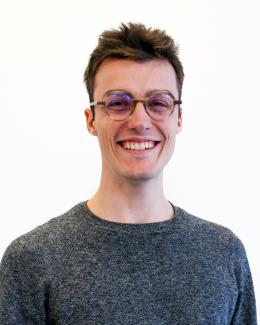Olivier Lévêque: Observing the infinitely small
Olivier Lévêque is a PhD student in information and communication sciences at the Charles Fabry laboratory (LCF - Université Paris-Saclay, Institut d'Optics Graduate School, CNRS). His thesis focuses on “the co-design of imaging systems to extend the depth of field and application to the localisation of single molecules".
Tell us about your thesis subject.
My thesis focuses on increasing the depth of field in microscopy using photoactivated localisation. Localisation microscopy is very modern optical microscopy technology used to observe miniscule biological samples measured in nanometres. My goal is to extend the depth of field: to increase the depth of clarity of an object in order to be able to observe thick biological samples with very high resolution. Such a technological breakthrough would enhance biological diagnosis.
What is your academic background?
After high school and a preparatory course in physics and technology (PTSI PT), I joined ENS Paris-Saclay where the quality and excellent level of scientific education have made me appreciate the world of research and teaching. I was gradually convinced to consider a thesis as my first professional experience. I then completed a Master’s programme specialising in "Information and Image Processing" at CentraleSupélec where I met the scientific team I now work with.
Why did you decide to participate in MT180?
For the challenge! It is an opportunity to meet PhD students from a wide range of research areas. It also forced me to reflect on the possible applications of my work and how to popularise them. It is completely different to what I do every day. It is very exciting!
What do you intend to do when you finish your thesis?
That is a difficult question! A PhD is a rich professional experience that opens the way to many professional sectors related to research, education and industry. I plan to use the remaining two years to clarify my professional future.
